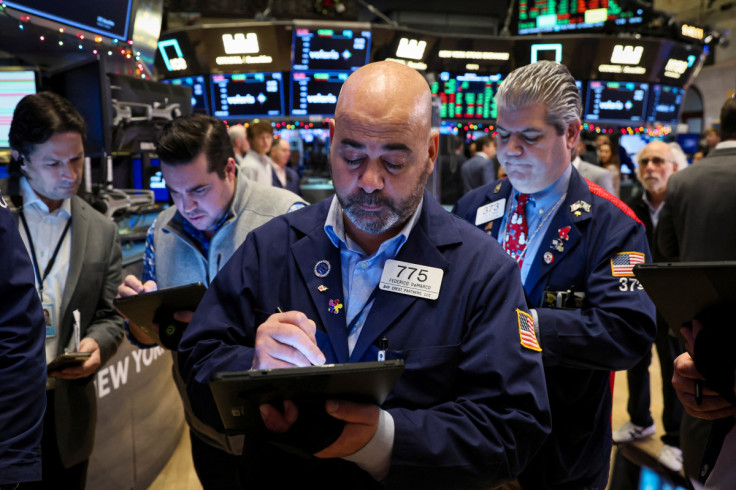Wall St Rises As Focus Turns To Inflation Data, Fed

U.S. stock indexes kicked off an eventful week on a positive note as investors braced for inflation data and the Federal Reserve's policy decision amid worries of a looming recession.
Much of the boost to Wall Street's main indexes on Monday came from a 2.1% rise in shares of Microsoft Corp, following the software maker's plans to buy a 4% stake in the London Stock Exchange Group.
Market participants are expecting the U.S. central bank to veer slightly from its aggressive rate-hike path as the economy shows signs of a strain from its recent policy actions.
The outcome from the Fed's two-day meeting is scheduled for Wednesday, with money market participants seeing a 93% chance of a 50-basis-point rate hike to 4.25-4.50%, and a terminal rate of 4.96% by May 2023.
Data due on Tuesday is expected to show consumer prices rose 7.3% in November on an annual basis, easing from the 7.7% rise in the previous month, while the core rate, which excludes volatile food and energy prices, is expected to have moderated to 6.1% from 6.3% in October.
The numbers will come on the heels of November's slightly higher-than-expected producer price reading on Friday, amid a jump in the costs of services, but the trend is moderating, with annual inflation at the factory gate posting its smallest increase in 1-1/2 years.
"There's certainly the concern that potentially high inflation could create the perception that the Fed might be more aggressive in its tightening," said Randy Frederick, managing director of trading and derivatives for Charles Schwab in Austin, Texas.
"The market is certain that we're going to get half a point hike, but I think it (economic data) does change the prospect of what might happen further down the road."
Treasury Secretary Janet Yellen on Sunday forecast a substantial reduction in U.S. price pressure in 2023, while also acknowledging a risk of a recession.
Wall Street's main indexes have slumped this year on fears of aggressive rate hikes triggering a U.S. recession. The Nasdaq and the S&P 500 have fallen 29.5% and 17.2%, respectively, so far in 2022 and are on track for their worst yearly performance since 2008.
At 10:05 a.m. ET, the Dow Jones Industrial Average was up 165.64 points, or 0.49%, at 33,642.10, the S&P 500 was up 12.74 points, or 0.32%, at 3,947.12, and the Nasdaq Composite was up 28.94 points, or 0.26%, at 11,033.56.
Seven out of the 11 major S&P 500 sector indexes were in the green, led by energy and technology stocks.
Most rate-sensitive shares including Apple Inc, Nvidia Corp and Alphabet Inc gained between 0.1% and 1.0%.
Among other stocks, Rivian Automotive Inc lost 2.7% after the company paused its partnership discussions with Mercedes-Benz Vans on electric van production in Europe.
Biotech firm Horizon Therapeutics Plc jumped 14.6% following a buyout offer from Amgen Inc, while Coupa Software Inc surged 26.7% on a media report of Thoma Bravo LLC being in advanced talks for an acquisition.
Advancing issues outnumbered decliners by a 1.08-to-1 ratio on the NYSE and 1.01-to-1 ratio on the Nasdaq.
The S&P index recorded no new 52-week highs and two new lows, while the Nasdaq recorded 29 new highs and 136 new lows.
© Copyright Thomson Reuters {{Year}}. All rights reserved.





















